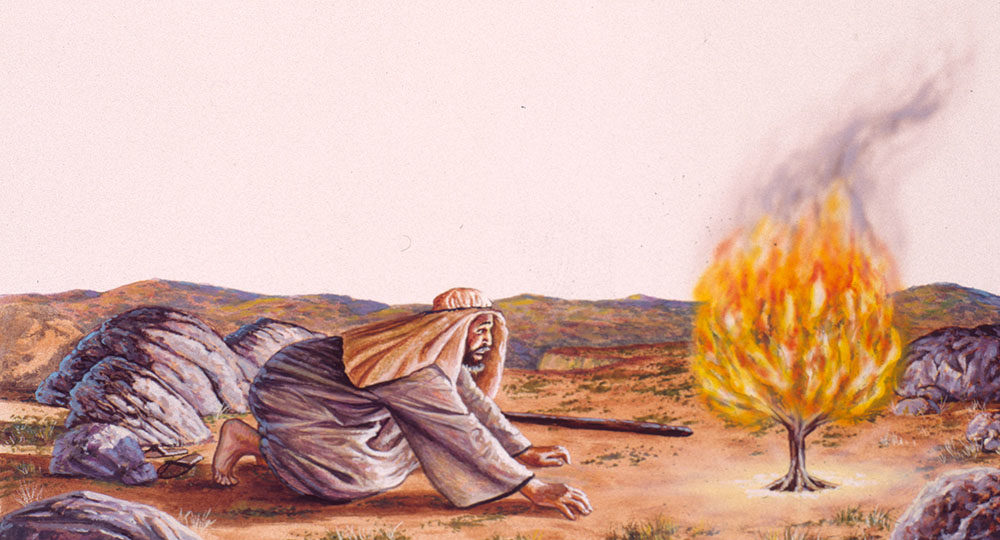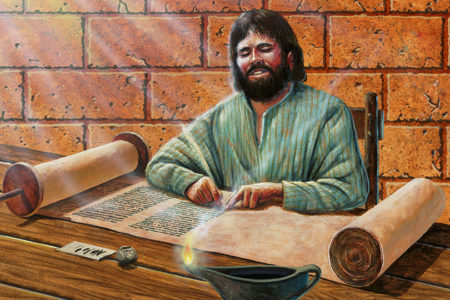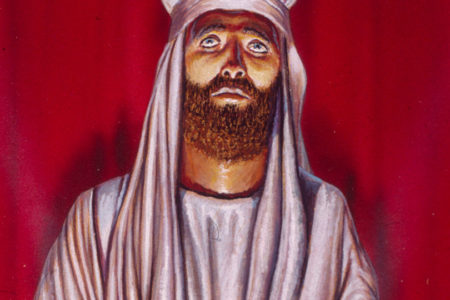Jesus Is Better Than Moses
Have you ever wondered what it would be like to read your newspaper at night without the convenience of a light bulb? Hard to imagine, isn’t it? Yet this luxury is only 100 years old. The world stopped burning oil lamps because of the creation of someone who had only three months of formal schooling and lost his hearing at the age of 12. In 1879, this young man demonstrated how electricity could illuminate darkness for 40 hours using a small cotton thread. The incandescent lamp was born. It is difficult to imagine life without the benefit of electric light, the result of the creativity of Thomas Alva Edison. His inventions produced a change in the cultures of the world. The old ways soon died out. The dark nights grew brighter and longer. Some few resisted the change, but the majority welcomed this radical shifting its customs. Unfortunately, this was not the case when a new religious leader named Jesus appeared in Jewish society some 2,000 years ago.
Imagine what life would have been like if you were a newly converted Jewish believer in the first century. Your family had raised you to firmly believe in the law of God, the Torah, which was given by God’s greatest prophet, Moses. You were anticipating the Messiah’s arrival. Then you heard stories about someone who claimed to be that Messiah, but family and friends dismissed Jesus as a failure. After, all, they reasoned, if He had been the true Messiah, why hadn’t He brought freedom from the Romans? And why had He died at such a young age? Even more objectionable was His claim to be the Son of God. “Blasphemy,” your religious leaders would have told you. Yet the stories about His teaching and miracles moved your heart in an entirely different direction. You rested your faith in God and His promised Messiah, Jesus. Since then life has not been easy. The pressures from your parents, relatives, and friends are almost too much to endure. “Could I be mistaken?” you silently wonder. Perhaps Jesus was deluded and these new Christians suffer the same deception. Maybe it’s time to go back to the “good old days.” Then you hear about a special document written to Hebrew Christians like yourself. Its message is clear: Jesus is much better than what you had in Judaism—no turning back!
Jesus Is a Better Prophet Than Moses (3:1–6a)
Hebrew believers in Jesus faced continual friction from their fellow Israelites during the first century. Jewish reverence for Moses is illustrated in the writings of Eusebius and Rabbi Moses Maimonides. First, Eusebius, who lived about AD 300, quoted from an older poem by a certain Jewish dramatist named Ezekiel. In the poem, Moses was described as sitting on a throne that reached to the heavens. His mind was able to “survey all things in time, past, present, and to come.”1 The second example comes from Rabbi Maimonides, one of Judaism’s greatest teachers, who lived in the 12th century. He echoed the traditions the rabbis had handed down for generations by listing 13 great principles of the Jewish faith. To this day, almost every Jewish prayer book contains these words. They are enshrined in the song “Yigdal,” which is sung in synagogues around the world. Maimonides’ seventh principle clearly states, “I believe with perfect faith that the prophecy of Moses is absolutely true. He was the chief of all prophets, both before and after him.”2 Maimonides made the following helpful points about Moses’ superiority to other Old Testament prophets.
First, God spoke to Moses “mouth to mouth” (Num. 12:8), whereas all other prophets had an intermediary. Second, God spoke to Moses while he was awake and in control of all his senses (Ex. 25:22; Num. 7:89); all other prophets heard God’s words in visions (Ezek. 8:3), trances, or night dreams (Gen. 20:3; 31:24; 1 Ki. 3:5). Third, other prophets were physically agitated or weakened by their prophecies (Dan. 10:8, 16), but Moses suffered no ill effects because “the Lᴏʀᴅ spoke unto Moses face to face, as a man speaketh unto his friend” (Ex. 33:11). Fourth, Moses could approach God at any time (Lev. 16:2; Num. 9:8), but other prophets had to wait until God initiated the prophetic message.3
So great was Moses, said Maimonides, that he “comprehended more of God than any man in the past or future ever comprehended or will comprehend. And we must believe that he reached a state of exaltedness beyond the sphere of humanity, so that he attained to the angelic rank and became included in the order of the angels.”4 This is quite an exalted view of the great lawgiver who received on Mount Sinai the written law, the Torah (the first five books of the Old Testament). Jewish tradition states that Moses also was given the oral law, the interpretations of the Torah that Jesus referred to as “the tradition of the elders” (Mt. 15:2). Moses has indeed been venerated by Judaism to such an extent that no other human supersedes him in religious prominence.
With such a lofty view of Moses, it is no wonder that Jewish believers were buffeted by their Jewish contemporaries who advocated doubting Jesus’ credibility. The direct words of Hebrews 3:1 answered the critics: “consider … Jesus.” The call was to look beyond their doubts to the person of Jesus Christ. He alone is the one sent from God, and He is the great “High Priest” who has opened free access to the Father (Heb. 3:1).
Hebrews 3:2–6a presents a comparison between Moses and Jesus.
| MOSES | JESUS | |
| Their Characters (3:2) | Faithful | Faithful |
| Their Houses (3:3–4) | A Servant of It | The Builder of It |
| Their Positions (3:5–6a) | A Servant | A Son |
Both men were faithful in their assigned missions. The Almighty commanded Moses to lead His people out of Egypt’s slavery and into the physical rest of the promised land. Jesus was commissioned by God to open the way to spiritual rest by His death and resurrection for sinners. Both completed their tasks. But there the comparison ends, for Jesus is actually the builder of the house in which Moses served. Moses was “a servant” in God’s house (the Israelite people). Jesus is “a son over” God’s house (the church). The wonder of the gospel is that Jesus is the final and greatest prophet from God. He fulfilled Moses’ own prophecy about a coming prophet (Dt. 18:15, 18; Acts 3:22). Christianity never depreciates Moses; it simply puts him in his proper place, Moses was good, but Jesus is better!
Hold On to Jesus! (3:6b–4:2)
The Warning (3:6b–12)
Persecution tempted these Hebrew professing believers to waver in their allegiance to Jesus. The warning came loud and clear that if they rejected Jesus, there would be no hope of salvation. “[Holding] fast the confidence and the rejoicing of the hope firm unto the end” (Heb. 3:6b) was evidence that they were true followers of Christ.
Paul issued a similar declaration to the Corinthian church: “By which also ye are saved, if ye keep in memory [hold fast] what I preached unto you, unless ye have believed in vain” (1 Cor. 15:2). The faith that saves is distinguished from a temporary profession by true believers holding firmly to the Lord Jesus Christ. Jesus illustrated this in the parable of the soils: “And these are they in like manner that are sown on stony ground, who, when they have heard the word, immediately receive it with gladness, and have no root in themselves, and so endure but for a time; afterward, when affliction or persecution ariseth for the word’s sake, immediately they are offended” (Mk. 4:16–17).
In Old Testament days, the Israelites experienced similar testings while wandering in the wilderness (Heb. 3:7–11). Those trials revealed that some of them never possessed true faith in God. Their hardened hearts continued to rebel during the 40 years, and God denied them entrance into the land of rest. Being a citizen of the Israelite nation was no guarantee that an individual actually trusted in the Lord. In the same way, just being associated with the Christian church does not automatically make a person a true believer.
This is clearly a call to examine your reasons for following Jesus Christ. If you are ready to give up on God, as some first century professing believers were opting to do, then this warning is for you. All true believers will encounter trials that test their faith and are intended to lead them closer to God. “An evil heart of unbelief,” however, “in departing from the living God” (Heb. 3:12) reveals the absence of saving faith.
The Exhortation (3:13–4:2)
The evidence of genuine faith in the Messiah Jesus is our consistent confidence, not in ourselves, but in Him. With Jesus as our focus, we may rest confidently in Him with full assurance that He will keep us.
Hebrews 3:13 introduces a passage that focuses on exhortation. This keyword (3:13) embodies the idea of active personal involvement. Such steadfast involvement serves to encourage believers and produces a lifestyle that becomes contagious, thus encouraging other believers. On the other hand, it is a serious matter when people harden their hearts against God. Such people will “not enter into his rest … because of unbelief” (Heb. 3:18–19). Such an attitude of heart soon produces a lifestyle manifesting unbelief. Therefore, we are exhorted to “fear” and examine our hearts (Heb. 4:1).
This is yet another call for self-inspection, for some who claim to trust in Jesus as Messiah may “come short” because they lack true faith (Heb. 4:1). It is not enough, the author emphasizes, to hear the gospel. Hearing must be “mixed with faith” in order to produce a life that pleases God (Heb. 4:2).
Jesus Provides a Better Rest Than Moses (4:3–11)
God’s “rest” is mentioned repeatedly in this section of Hebrews (3:11, 18; 4:1, 3–5, 8–11). The first two references point to the promised land as a rest for the wandering Israelites (cp. Num. 14:30; Ps. 95:11). However, in Hebrews 4 the author referred to another sort of rest. All those who trust in Jesus enjoy this rest: “For we who have believed do enter into rest” (Heb. 4:3). A similar promise was offered by our Lord Jesus who said, “Come unto me, all ye that labor and are heavy laden, and I will give you rest” (Mt. 11:28). What a wonderful promise our Savior offers! The world advertises finding rest through driving the ultimate car, wearing the finest clothing, or eating the most delicious food. Such promised rest, of course, is but another attempt to fill the spiritual void with materialism. Indeed, perhaps a better term to describe the reality of this type of life is unrest. Sadly, those who refuse to accept Jesus’ rest in this life will never find it. One of the most dreadful aspects of eternal punishment and separation from God is the fact that there will be no rest for unbelievers.
We who trust in Jesus as our Messiah enjoy a spiritual rest today and the sure promise of a more abundant rest in eternity. The author reminded those Jewish believers that even the illustrious Joshua, whose name corresponds to “Jesus” in the New Testament, never provided full rest for the Hebrews in the land of Israel (Heb. 4:8). The better rest that Jesus provides includes forgiveness of sins, peace with God, and the prospect of a better country. The innumerable blessings of salvation are included in that rest. We share some now, and we will enjoy others for all eternity. We have only begun our blessed rest in Jesus.
The word rest in Hebrews 4:9 is unique. It is not the same word used throughout this chapter; rather, it means a sabbath rest. The Israelites under the Mosaic Covenant were subject to the fourth commandment, “Remember the sabbath day, to keep it holy” (Ex. 20:8). That regulation was a picture of God’s rest on the seventh day of creation (Gen. 2:2; Ex. 20:11). Although believers in this age are no longer bound by the Mosaic law, we still enjoy the principle of the Sabbath. “For he that is entered into his rest, he also hath ceased from his own works, as God did from his” (Heb. 4:10). We who have been saved without “works” (Eph. 2:8–9) are resting by faith in Jesus Christ.
Our present salvation rest is but a foretaste of glories above. We still must “labor, therefore, to enter into that rest” (Heb. 4:11). Some take the word labor to mean that we must work our way to heaven, but this is not the case. Salvation is “Not of works,” as Paul stated clearly (Eph. 2:9). However, the word labor is elsewhere translated “Study” (2 Tim. 2:15), “endeavor” (2 Pet. 1:15), and “be diligent” (2 Pet. 3:14). We, as pilgrims, must have an attitude of diligence during our earthly journey. Never looking back, never falling away, we must press on to our heavenly rest.
Conclusion
On the Mount of Transfiguration Jesus had a conversation with Moses and Elijah. God the Father once and for all declared that those two Old Testament prophets were submissive to the greatest prophet: “This is my beloved Son, in whom I am well pleased; hear ye him” (Mt 17:5). Moses was good, but Jesus is better! “And when they had lifted up their eyes, they saw no man, except Jesus only” (Mt. 17:8).
Just as Thomas Edison’s electric light bulb illuminates our world, so God’s Son brings the light of life to all who trust in Him.
ENDNOTE
- Eusebius, Preparation for the Gospel, Part 1, translated by E. H. Gifford (Grand Rapids, MI: Baker, 1981), 440.
- Aryeh Kaplan, Maimonides’ Principles (New York, NY: Union of Orthodox Jewish Congregations of America, 1984), 53.
- Ibid., 54-55.
- Louis Jacobs, Principles of Jewish Faith (Northvale, NJ: Jason Aronson, Inc., 1988), 206.







